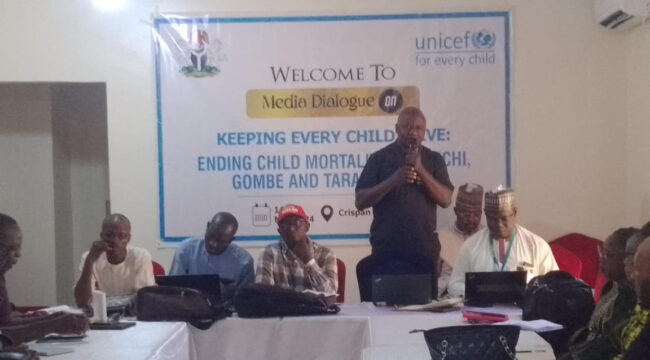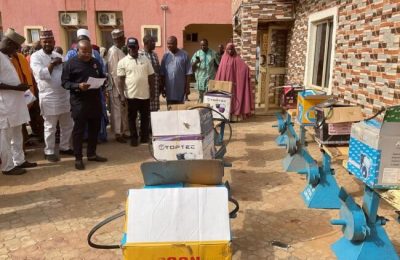
Statistics from the National Demographic Health Survey (NDHS) report indicate that every day, Nigeria loses 2,300 Under-5 children in rural areas, amounting to 157 per 1,000 live births.
The disclosure was made by UNICEF Health Officer at the Bauchi Field Office, Oluseyi Olosunde, while making a presentation on Trends on Child Mortality in Gombe, Bauchi and Taraba states during a Media Dialogue on Child Mortality organised by the UNICEF Bauchi Field Office held at the Crispan Hotel in Jos, Plateau State, on Thursday.

He said that the Sustainable Development Goals (SDGs) adopted by the United Nations were developed to promote healthy lives and well-being for all children as well as end preventable deaths of newborns and under-5 children by the Year 2030.
Olusyi Olodunde added that the figure doubles those in urban areas, which amounts to 92 per 1,000 live births.
According to him, the “neonatal mortality rate in Nigeria stands at 41 per 1,000 live births. representing 10 percent globally, the infant mortality rate stands at 63 per 1,000 live births, while for under-5, the mortality stands at 110 per 1,000 live births.”
While making a comparison between the NDHS report of Child Mortality of 2018 and 2023/24, the UNICEF Health Officer said that the North-East subregion for neonatal mortality recorded 43 out of every 1,000 live births in the 2018 report to 2023/24, 77 for infant mortality with a slight drop in the 2023/24 NDHS report, while for under-5 mortality, the record showed 160 in the 2018 report with a significant drop in mortality in the 2023/24 NDHS report.
While giving a breakdown of the health services in Bauchi, Taraba, and Gombe states, he said, “From the report, about 7 out of 10 deliveries take place at home in Bauchi State, representing 68.9%, and Taraba State, representing 67%. About 5 out of 10 in Gombe State represent 51.5%.”
He added that “about 3 out of 10 newborns in Bauchi, representing 76.1%, and Taraba, representing 5 out of 10 in Gombe State, have not been reached with postnatal care. 3 out of 10 children have not received any immunisation.”
Speaking earlier in her presentation on ‘What is Child Mortality’, exploring a hydra-headed menace (infant, neonatal, and U-5), a consultant paediatrician with the Jos University Teaching Hospital (JUTH), Dr Ruth Adah, said that every child’s death is significant because every child carries a genetic code that contains the answer for the challenges of a country.
According to her, since it is the fundamental right of every child to live, the child mortality of a country shows the fragility of the health system of a country as well as the level of socio-economic development of the country.
She said that the North-East subregion has the worst child health indices/child mortality rate, adding that for Bauchi State, for instance, out of every 1,000 live births, 48 die every year.
All the health experts who made presentations, however, observed that child mortality in the country can be prevented with adequate attention paid to the situation.
The Media Dialogue was attended by Journalists (Health Reporters) from Bauchi, Gombe and Taraba States.
ALSO READ THESE TOP STORIES FROM NIGERIAN TRIBUNE







